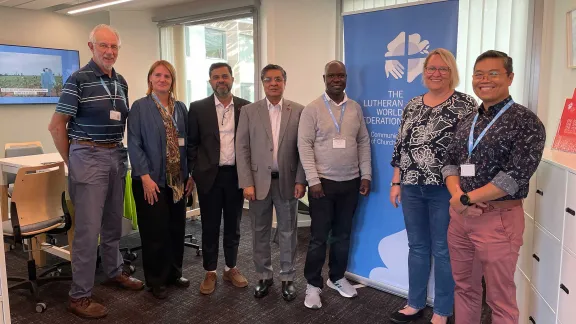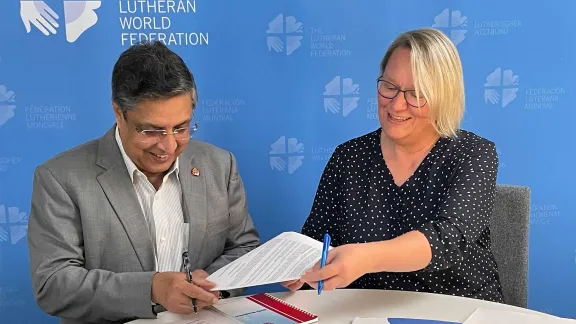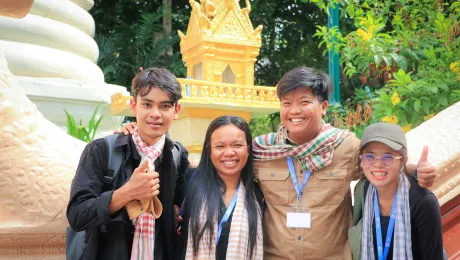
LWF staff with Tapan Kumar Karmaker and Tarik Sayed Harun, RDRS. Photo: LWF/ C. Kästner-Meyer
"New ways of working together”
(LWI) - A renewal of a long-standing cooperation and partnership: On 18 October 2024, The Lutheran World Federation (LWF) World Service and Rangpur Dinajpur Rural Service (RDRS) in Bangladesh signed a Memorandum of Understanding that outlines future cooperation in development work: Together they will work on humanitarian action and climate change adaptation, with a particular focus on youth engagement.
"The latest phase in our journey began in 2019, with the Rohingya response," says Tapan Kumar Karmaker, Executive Director of RDRS. "But now we think that we can work together beyond the Rohingya response to mobilize more resources for development work – including the Rohingya response, but also in climate change, education, and livelihoods for young people."
"The collaboration with RDRS since 2019 has given birth to a new kind of relationship between us as organizations with a shared history," says Maria Immonen, director of LWF World Service. "We have found new ways of working together, building on the strong national recognition and broad capacities of RDRS and the global reach of World Service to bring our respective strengths together in a new way."
"Our understanding of possibilities and opportunities has become broader over the past five years, and we are excited to be able to document this in an updated version of our joint MoU.," she adds.

RDRS Executive Director Karmaker and LWF World Service Director Immonen (from left) sign the MoU. Photo: LWF/ C. Kästner-Meyer
Long common history
LWF's work in Bangladesh cannot be separated from RDRS which was founded as an LWF World Service Country program in 1972. Twenty-five years later, when the program was localized, it registered as a national organization in Bangladesh.
When violence erupted in Myanmar, and great numbers of Rohingya refugees crossed the border to Bangladesh in 2017, LWF and RDRS came together to organize an emergency operation in Cox's Bazar, the world's largest refugee camp. Approximately one million Rohingya are stranded here under very challenging conditions. LWF and RDRS have provided and continue to provide relief goods and protection, set up livelihood projects, and train people in disaster preparedness.
Development aid
RDRS director Karmaker explains that together the two organizations will go beyond responding to the needs in Cox's Bazar. "We have started new projects in climate change adaptation, and we identified gender safeguarding and youth and adolescents as a concern."
The joint work will also continue to serve displaced Rohingya in the country. "The young people live in an enclosure; they have nothing to do, and there is a risk that they will engage in illegal activities. Together, we can advocate on their behalf and build their skills so they can build their own enterprise when they return".
RDRS is also prepared to share 27 years of localization expertise with other former LWF programs. The Bengali NGO today is a successful program with a budget of 37 million USD per year, largely focusing on microcredit work. "We can share our learnings, our successes and our mistakes. Localization and sustainability are important for all of us", Karmaker concludes.


